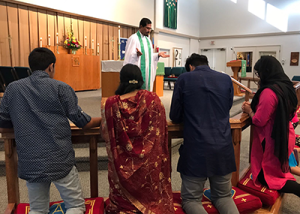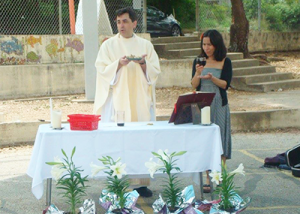Interested in Church Planting?

If you are discerning a call to be a church planter in the Episcopal Diocese of Texas, you are encouraged to first review our list prioritized areas below. After reviewing, email an OTM portfolio and resume to kjohnson@epicenter.org. More information on the position can be found here.
If you are a congregational leader in the Episcopal Diocese of Texas discerning whether your congregation is called to be a church planting church, please see the Sending Congregations section below.
“We want to reach the people we believe God in Christ Jesus invites us to meet in the world. It is a plentiful harvest if we will but labor with God. (Luke 10:1-20)” – Bishop Andy Doyle
The Diocese of Texas is actively identifying leaders and locations to plant new communities that are faithful to our Episcopal tradition and responsive to the context they are planted in, reaching those that are not yet participating in Christian community.
Our Process

Leadership
The Bishop Diocesan identifies leaders and locations for new communities

Potential church planters go through an assessment process to determine their proclivity for church planting. The goal of this process is to clarify for leaders how they are called to participate in God’s mission. Following an initial phone consultation, candidates will undergo an assessment and are required to submit a document describing what motivates their personal interest in church planting. After completion, the diocese will schedule a consultation with two facilitators. The facilitators of the consultation will submit these documents along with their recommendation for the Bishop’s consideration.
Location

Locations for church plants are determined through an ongoing review of the growing population areas within our diocese, discernment with leadership of the diocese and sending congregations as well as taking into consideration the strengths and passions of potential planting candidates.
Sending Congregations
Sending congregations are those that are called to be churches that plant other churches. While each congregation is unique and the gifts it has to offer are congregation-specific, each sending congregation sees its role as pastoral, financial, spiritual, and sacrificial. Sending congregations will host a church planter for 6-18 months. During this time, the planter will develop relationships, cast vision and build support for the new community they will launch after the “gestation” period within the sending church. In preparation, a potential sending congregation will be expected to complete a Holy Cow! study. This study assists a congregation in determining its readiness for church planting. The consultants that facilitate this study will provide their recommendations for the Bishop’s consideration.
Contact us if you would like to discuss partnering with the diocese for the sake of church planting.
Below is a map of locations listed in high to low priority: ![]() High
High ![]() Medium
Medium ![]() Low
Low
Phases of Church Planting
It is the goal of our Diocese to develop healthy, self-sufficient missional congregations. Below is a brief sketch of the four phases of development of a church plant. The intent of this is to establish the general expectations of the diocese, sending congregation, planter and new faith community.

Phase 1: Recruitment
- Candidate assessed, recommendation submitted to Bishop
- Determination of ordination status confirmed
General location ofplant determined- Planter recruited; Diocesan funding begins
Phase 2: Placement
- Planter relocates (if required) and begins missional work
- Planter begins coaching program
- Planter joins
cohort of planters - Core group recruited and prepared
- Preview public gatherings offered
Phase 3: Commencement
- Refined location, congregation name submitted and approved
- Weekly worship and stewardship begins
- Diocesan funding increases
- Fellowship status granted from Bishop
- Formation of
legal religious entity
Phase 4: Maturation
- Diocesan funding reduction commences
- Mission status granted
from Bishop - Partnership with Diocese for church planting developed
- Parochial status granted
from Bishop
View EDOT’s Church Planting Handbook.

